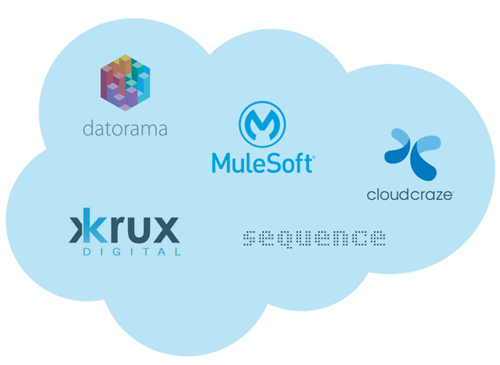Salesforce continues acquisition spree past CRM Software-as-a-Service

Since the beginning of 2016, Salesforce has completed 16 acquisitions, integrating a wide range of new companies and technology into the Salesforce ecosystem. Most recently, in July, Salesforce acquired Datorama, a New York City-based marketing analytics firm that specializes in data integration, visualization and modeling, for an estimated $800 million. The acquisition of Datorama is intended to enhance the power of Salesforce’s Marketing Cloud with expanded data integration and intelligence. It reflects Salesforce’s overall strategy of expansion beyond customer relationship management SaaS, a space it essentially revolutionized.
Salesforce made its largest acquisition to date in March 2018, acquiring MuleSoft for $6.5 billion. MuleSoft, which provides integration software for connecting applications, data and devices, will become part of Salesforce Integration Cloud, enabling all enterprises to surface their data to deliver connected customer experiences across all channels and touchpoints. The intent is for MuleSoft to help Salesforce find new hybrid cloud customers utilizing all of their services and opening numerous cross-selling opportunities for the CRM behemoth. Salesforce wants to eliminate all possible obstacles that could stand between enterprise-level organizations and becoming Salesforce customers.
Other notable acquisitions since 2016 include the acquisition of B2B online commerce transaction processing SaaS company, CloudCraze, in March 2018 for $182 million; their acquisition of digital marketing services company Sequence for $26 million in January 2017; and their acquisition of Krux Digital for $680 million, which provides real-time audience data management and targeting SaaS for marketers, web publishers and ad agencies, in October 2016.
Salesforce is making moves to enhance and expand the customer experience, while remaining committed to top-line growth. CEO, founder and chairman Marc Benioff has said “[O]ur approach is really different because we really see every B2B company and every B2C company becoming a B2B2C company.” Aside from expanded offerings, another result of these completed transactions is increased revenue and that Salesforce will reach its goal of $20 billion in sales “faster than imagined,” said Benioff. As Salesforce continues to grow while dominating the CRM market (according to IDC, they had 19.6% of the market in 2017), it will be exciting to see their future M&A plays and in what direction Benioff plans to steer the Salesforce ship in next.

